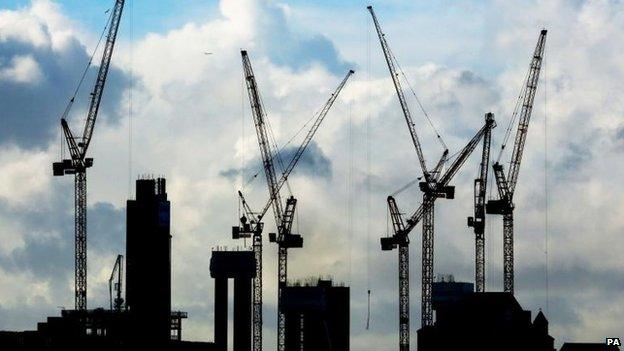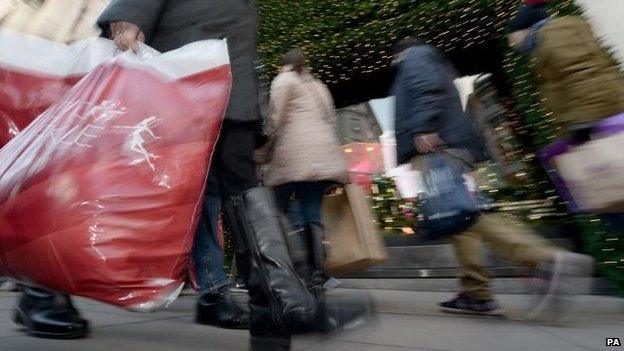A slower recovery
- Published
- comments

Construction output fell in the fourth quarter of 2014
There has been a slowdown in the British economy, driven by weaker construction, manufacturing and energy production - although it would be premature to see this as an end to the recovery.
GDP, or national income, grew 0.5% in the fourth quarter of the year, compared with 0.7% in the third and a recent peak of 0.8% in the second. That looks like a trend.
That said, annual growth in the last three months of the year was still a healthy 2.7%. In 2014 as a whole the economy expanded 2.6%.
The recovery is real. And it still has momentum, if less than before.
The deceleration is not surprising, in view of the flatlining of the UK's main trading partner, the eurozone.
And two of the negative influences, a fall in energy supply of 2.8% and in construction of 1.8%, are in industries that tend to be volatile.
That said, it does give pause for thought that growth is now apparently being driven to a large extent by retail and consumer spending.
This is potentially troubling, given that many would argue that the flaw in Britain's economy in the boom years before the crash and Great Recession of 2008 was that it was too reliant on debt-fuelled consumer spending.
There is some evidence from consumer debt figures that households are borrowing a bit more again. But there hasn't been a dramatic dip in the savings ratio. And it is arguable that consumers are spending the early windfalls from lower petrol prices.
But we were supposed to be rebalancing, towards manufacturing and investment. And although there has been a bit of that over the past couple of year, it appears to be petering out.
So in the latest period, all UK growth (and in fact a bit more than all) came from services, which rose 0.8%, identical to its growth in the previous quarter; manufacturing was just 0.1% higher, following a rise of 0.3% in the previous quarter.
What's the outlook for the months before the election?
Well the fall in gas and petrol prices, which puts money in our pockets, should continue to power household spending - and maintain the recovery at the kind of pace we enjoyed in 2014.
But one big uncertainty is what this does to our unsustainably large current account deficit, the gap between our earnings from and payments to the rest of the world, of 6% of GDP.
All that household consumption will suck in imports, but that may be offset by the lower price we are paying for oil.

Cheaper fuel costs should help to boost consumer spending
So the economy retains structural weaknesses. And when I interview the chancellor later today, if he doesn't say that is all the more reason for the country to stick to his "long term economic plan" - including attempts to mend the public finances - then I may have reason to question my sanity.
And George Osborne will insist that Britain continues to grow significantly faster than most other developed economies - especially those across the Channel, but not America.
But as the election looms, there is an important question about who has paid most for the recovery, the rich or the poor?
The Treasury's position, repeated today, is that "the richest 20% of households will contribute more to reducing the deficit than the remaining 80% put together" and that the "richest 10% of households have made the largest contribution to reducing the deficit".
But that is not desperately surprising in a country which has a progressive income tax system - and in which the highest rate of income tax was initially increased (and then partly reversed).
And what may fuel an important debate between now and polling day is a series of detailed reports, written by academics from the London School of Economics and the Universities of York and Manchester, showing how certain poorer and vulnerable groups have been disproportionately hurt by austerity and budget cuts.
Perhaps the most damaging claim made in the reports is that cuts to tax credits and cash benefits took more away from those in the bottom half of the income spectrum than these poorer people gained from the significant increases to tax allowances.
And they say that whatever savings were made from this rebalancing of benefits and tax allowances were wiped out by cuts in income tax for the better off.
The Treasury's response is to criticise the authors for not taking into account "the effects of changes to the vital public services on which so many rely" - including the protection given to schools and health budgets.
But this may be to compare apples with pears. Because what LSE, Manchester and York have tried to do is look at different elements of tax and social policy, and examine its impact on specific groups - rather than come up with one simple number that shows that inequality had widened or narrowed (although they do say that poverty probably increased after 2012-13 and may get worse).
And they make two particularly resonant claims.
First, that families with children under five suffered significant cuts to services, as inflation-adjusted spending per child on childcare, Sure Start and early education services fell 25% between 2009-10 and 2012-13. They also say that benefit and tax reforms hit these families harder than other households.
Second, that users of adult social care fell 7% per year, at a time when there was 10% rise in the population aged over 65, with care-at-home services especially hard hit.
The point, of course, is that hard decisions had to be taken to fix the public finances. What will now, presumably, be the important debate between now and the election in May is whether the fairest and right decisions were made.